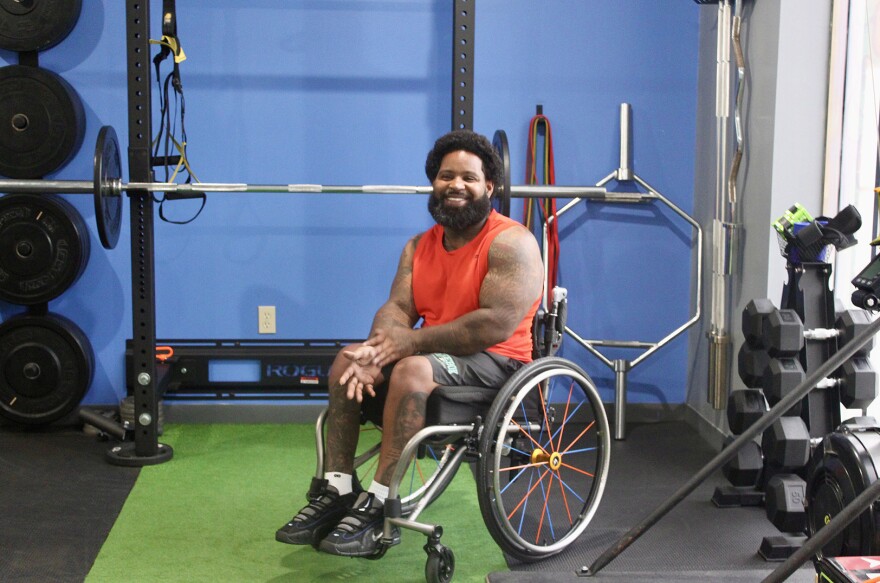Wesley Hamilton’s latest project — an inclusive gym in Westport — provides community and a comfortable environment for other people with disabilities, the entrepreneur-turned-reality TV personality and advocate shared.
Hamilton, founder of the Disabled But Not Really Foundation and Kansas City social entrepreneur, opened the doors to his new training hub at 3939 Washington St. in April. The space now serves as the home base for the foundation’s HelpMeFit Challenge cohorts.
After gaining international recognition from an appearance on Netflix’s “Queer Eye” in 2019, Hamilton began collaborating with existing gyms to create a level of inclusivity in their businesses. He ultimately found a lack of necessary equipment and staff training, which led to an unwelcome environment.
Seeing that ongoing service gap, DBNR moved to open its own dedicated gym that could address the concerns and specific needs of his community.
“You can have your facility inclusive, but the lack of empathy and awareness creates a barrier for people,” he explained. “Our program is based off of three pillars, which are courage, confidence, and competence. And I was just in a place where I didn’t want the individuals that we were serving — especially people that we’re trying to get confidence and courage — to be in a setting that was intimidating.”
Hopefully, he continued, once gym users gain courage and confidence in the 12-week HelpMeFit program, they will be comfortable working out at other local gyms.
“Instead of putting you out there with the wolves, we make you into a wolf first,” he said. “That was our switch, wanting to bring more value and really boost the success rate of the people we’re focused on.”

The new gym provides a variety of accessible equipment, including free weights, squat rack, adjustable pull-up bar, jump ropes for people in wheelchairs and with limb differences, lap mats, and cardio equipment that can be adapted to individual users, Hamilton said. The DBNR team also had the space renovated to widen the doors and install an automatic door opener and automatic devices in the bathroom.
“It’s a mix of a CrossFit gym with a fully functional type of facility,” he added.
The new DBNR facility also has its own parking lot, Hamilton noted, which was a challenge with some of the other local gyms.
“Even though we don’t have a big parking lot, it brings comfort to the individuals to be able to pull up,” he said. “A lot of our partnerships were in awkward places (for parking).
But it’s not just about the adaptive equipment and accessible parking, he shared. It’s also about community for those with disabilities.
Hamilton’s life changed in 2012 when he was shot two times, leaving him paralyzed below the waist. Turning his life around, Hamilton founded Disabled But Not Really in 2015, was notably featured on Season 4 of Netflix’s “Queer Eye,” and serves as a local philanthropist and motivational speaker. He also hosts a podcast called “Out of the Shadows.”
“The facility needed to be a safe place,” he explained. “In our program, there’s people that have been through some traumatic experiences. We do deal with a lot of gunshot survivors. So when you have people that literally just had something change, you want to make sure that the environment is safe, where they’re not paranoid.

“Our goal is really to make individuals know that they don’t have to be defined by their circumstances,” Hamilton continued. “But also help them get over the lumps that will get them back in society.”
The gym space is small, he noted, so the organization plans to eventually find a bigger space and expand the inclusive gym to other locations across the metro and to other cities. The foundation is organizing a gala in November to allow community members to partner with them and help the facility grow.
“If this model is something that is really making a difference — which we have seen so far it is — then our goal is to create something larger, but also scale it,” he added.
Hamilton — who also aims to launch an entrepreneurship initiative for people with disabilities soon — and the Disabled But Not Really Foundation recently gained even more visibility for the work they are doing after he returned to “Queer Eye” to appear on an episode in Season 7. He was brought back to the show to encourage hero Ray “Speedy” Walker, who was paralyzed from the chest down in a car wreck that killed his mom and aunt.
“It was a great thing to really show the work that we do here,” he said. “We do more than just the level of bringing someone to fitness, but we’re going to make sure that your environment is comfortable. We’re going to provide the resources to help you grow.”
“This episode and this experience allowed us to really see that we can create a very inclusive environment in Kansas City,” he added, “and it just starts with us going to people’s doors. We have a new initiative where we’re focusing on seeing what businesses in Kansas City actually want to be more accessible and then be able to create that.”
This story was originally published by Startland News, a fellow member of the KC Media Collective.



